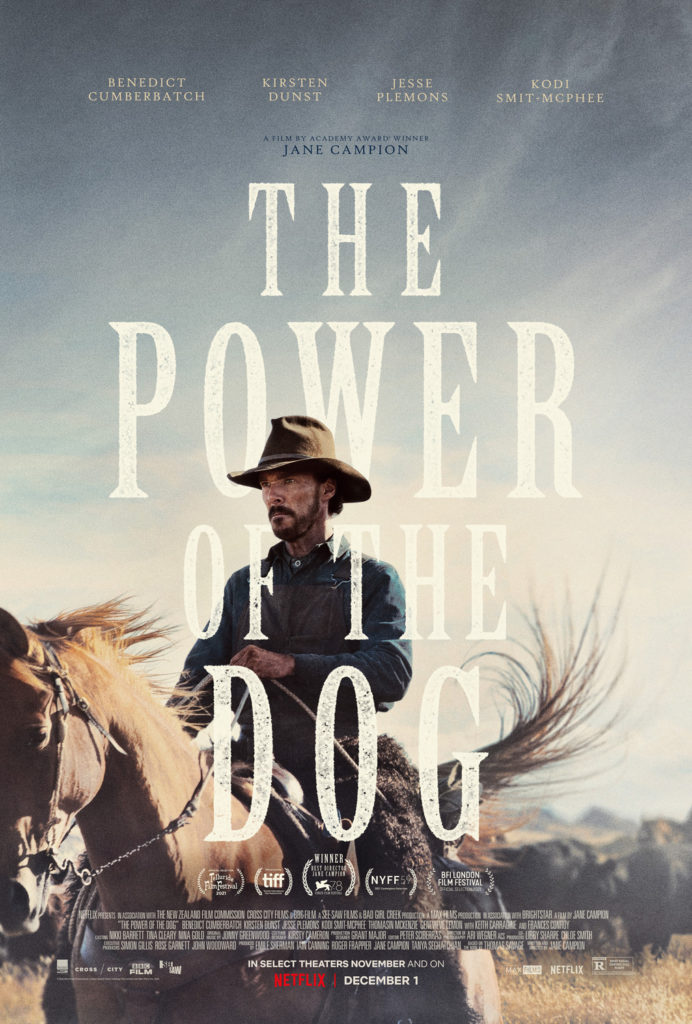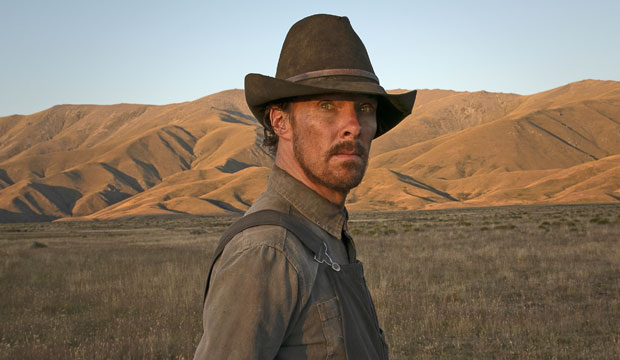Each Monday, I continue to share Western movie reviews as I go through the process of finishing post and releasing my 12 Westerns in 12 Months during 2020. I am watching these films not from an audience perspective but as a filmmaker, as a student of the genre.
Week 136: The Power of the Dog

Well, here it is… the film that makes every top ten list, gets nominated for a ton of awards, heralded by nearly all the critics, and the one I find to be a bad movie. There’s at least one every year and it continues to amuse me how some films just get swept up in the wave of accolades for no good reason. If you’re curious, here are my reasons for believing Jane Campion’s latest “Western” to be a bad movie:
1. Casting. I like Benedict Cumberbatch in the right role. And that’s the key: the right role. Earlier this year, he dazzled me in The Courier (if you haven’t seen it, please do). That’s the film which should be getting the award attention but of course, it was lightly praised and quickly forgotten. He fit that role and played it incredibly well. With a good amount of range as an actor, he can play a variety of parts but a Montana cowboy? It cracks me up that the filmmakers who seem to care most about “representations”, mostly for women and minorities of course, are the same ones who don’t think twice about casting an American character with a British actor. Look, either representation matters to you or it doesn’t; authenticity is important or it isn’t. But be consistent! What I’m saying is that no matter how good an actor Benedict is, he’s wrong for this part. I did not believe him for a single second as Phil Burbank. He’s just playing at it and playing with all his talent but he can’t be it. This reminds me of Billy Bob Thornton’s very insightful comment that if someone asked him to play Charles De Gaulle he’d turn them down because he’s not French. It doesn’t matter how good of an actor he is. But if someone asked him to play Davy Crockett, he would accept. And they did in a not-so-great film but he is excellent in it and I’d argue he’s better than the best British actor could possibly be in that role. Jesse Plemons is more in tune with this world and he would have made a much more interested Phil Burbank than Benedict.
2. The script and the “world”. Whether something was lost in the translation of Savage’s book (haven’t read it) or just severely misguided by Campion, the writing of this film and the world created from it just don’t work for me. I’ll give you one minor example: when the Governor visits the ranch for dinner and is introduced to Rose, he and his wife respond to her with complete disinterest. However, moments later in the film, they are both clamoring to hear her play the piano, moving their own chairs across the room with incredible enthusiasm. This is bad writing (and directing) to me. There’s no connection between the two moments. There’s no logic to the characters’ actions and reactions. And the film is full of these head-scratching moments. Furthermore, the world created by Campion doesn’t feel real, especially to a lover of Westerns. Does anyone work on this ranch? Am I the only viewer that found it odd that not a moment of honest hard work by Phil and his cowboys is shown in the film’s excessive runtime? Compare this to Giant (more on that later) in which a whole vibrant world is created that you can feel is working in and out of the frame. In one scene, a character asks another character why he doesn’t wear gloves? Umm… haven’t these people worked together for months, even years? The answer should be yes but in this instance, no, they just showed up, put on their costumes and waited for “Action”.
3. The music. Oh my… how much this film would be improved if they just took the damn score out. I’m all for experimental music in films but again, when it’s right. Greenwood’s score is so distracting, so over-the-top, so in the way of the film’s scenes. I found myself constantly wishing that it would stop when I was trying to enjoy and lose myself in the moment with these characters, a task which was hard enough to do already.
4. The reason for the film. What is this film trying to say? If it’s a message about toxic masculinity, I must be more out of touch with today’s culture than I thought. If Benedict’s character is supposed to be that toxic, I never understood why. When Kirsten Dunst (another performance that didn’t work for me) constantly cringes in horror at his presence, I literally had no clue why this was happening. It never made sense to me. Beyond being brash and honest about how he feels about her, what does Burbank really do wrong? On the other hand, Kirsten’s Rose is totally helpless. From my perspective, she is nearly worthless, an alcoholic character who plays the victim for no good reason. Does Campion’s film celebrate weak women and demean strong men? Maybe I’m missing something but that’s what I gathered from this narrative. The best scenes of the movie, and the only ones that really worked for me, were the ones that explored Burbank’s humanity. When we get to see his interest in the boy, the film barely begins to explore the reality of this character. Yes, he is harsh but that’s the world of Westerns! In one scene when he watches the boy ride and sees him fall off the horse without helping, is that supposed to be a bad thing? Because that’s exactly what most horse people would do: say that he needs to get up, brush himself off, and get back on again. I suppose I just don’t get this film and its reason for existence but it truly feels like this “Woke Western” is out to attack much of the stoic, iconic Western male ethos and to uphold a weak-minded way of seeing the world.
My advice is to go back and watch Giant, a great film set on a ranch with a variety of complex and interesting male/female characters, a film that gets it right. Because in my opinion, The Power of the Dog isn’t one of the best films of the year. It’s the worst.
Watched on Netflix.


